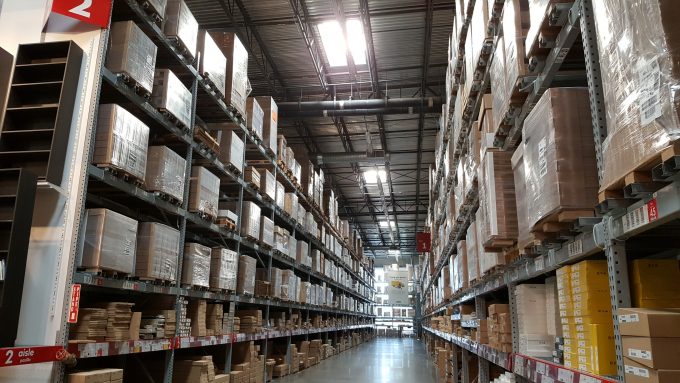Handbrake off in growth drive
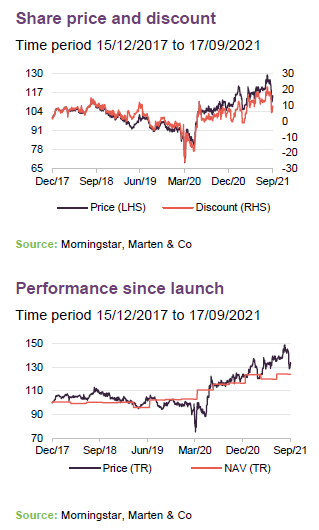
Aberdeen Standard European Logistics Income’s (ASLI’s) manager has taken a prudent approach to growing the fund thus far, taking a little-and-often capital raise strategy to improve the quality of the portfolio. However, it now proposes a £75m placing to help fund an identified investment pipeline worth €165m and take advantage of the structural tailwinds behind the logistics sector (see page 17).
ASLI’s manager says that it expects to capture significant rental growth in the short and medium term with the European logistics market characterised by growing demand for space – driven by a continued boom in e-commerce – and historic low levels of supply. The fund’s strong ESG credentials, with further initiatives to come, may illustrate the quality nature of the portfolio and are designed to help ensure that it is fit for the future.
Mid box and urban logistics across Europe
ASLI invests in, and actively asset manages, a diversified portfolio of logistics real estate assets in Europe with the aim of providing its shareholders with a regular and attractive level of income return together with the potential for long-term income and capital growth (target total return of 7.5% a year in euros).
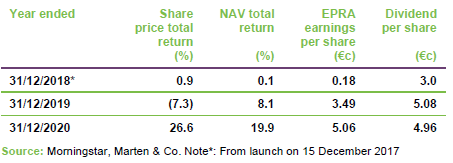
Fund profile
ASLI invests in a portfolio of European logistics assets, diversified by both geography and tenant, with a focus on well-located assets at established distribution hubs and within population centres. ASLI’s aim is to provide its shareholders with a regular and attractive level of income return, together with the potential for long-term income and capital growth (it has targeted a total return of 7.5% a year in euros). ASLI benefits from inflation-linked leases across its portfolio.
ASLI has an annual dividend yield target of 5% of the IPO price (100p). Dividends have historically been paid in sterling, with the assets and the income derived from them predominantly in euros. The manager may use currency hedging to help reduce the volatility of the income, but there is no current intention to hedge the capital value of the portfolio. Going forward, shareholders will also be able to elect to receive distributions in euros.
ASLI’s portfolio management services are undertaken by Aberdeen Standard Investments (ASI), led by Evert Castelein. Aberdeen Standard Investments Real Estate is the second-largest European real estate investment manager, managing €45bn of real estate, and has an extensive regional presence, with over 225 real estate investment professionals and offices in eight countries across Europe. More information on the investment team is available on page 22.
Market outlook – favourable supply and demand characteristics in European logistics set to persist
Talking to the manager, the seemingly exponential growth in demand for logistics space in Europe – associated with a rise in e-commerce and a strengthening of supply chains – is expected to endure long after the pandemic is declared over, and economies return to normal. Although online retailing penetration rates are expected to plateau and then fall slightly when physical retail stores fully re-open, the net gain during the pandemic is still expected to be considerable. In the 15 months since the global pandemic was declared, the European market recorded an e-commerce penetration rate that was previously predicted to take years to reach.
Much of this growth is expected to stick, with the Centre for Retail Research forecasting an average e-commerce penetration rate across Europe of 15.3% this year (compared to 12.0% in 2019), as shown in Figure 1. A whole new cohort of the population – such as older generations and other late adopters – and many retailers overcame barriers to online retailing out of necessity and have become comfortable in buying or selling goods in this manner.
Prologis – the world’s largest logistics developer – predicts a continued rise in e-commerce penetration rates due to the following reasons:
- consumer habits are sticky once barriers to adoption are overcome;
- innovation and supply chain investments made during the pandemic should increase competitiveness of online retail; and
- closure of bricks-and-mortar retail stores should mitigate future competition for consumers.
The penetration of online retail sales in the UK is greater than in most western countries, but all European countries are on a similar growth trajectory. In the UK, Savills identified a tipping point of 10.7% of total retail sales being online, which created rapid growth in occupational demand for warehouse space. Several countries, including France, Germany and the Netherlands, have online penetration rates above 10.7%, with others on the cusp. Savills expects these countries to see similar trajectories in take-up volumes to that of the UK.
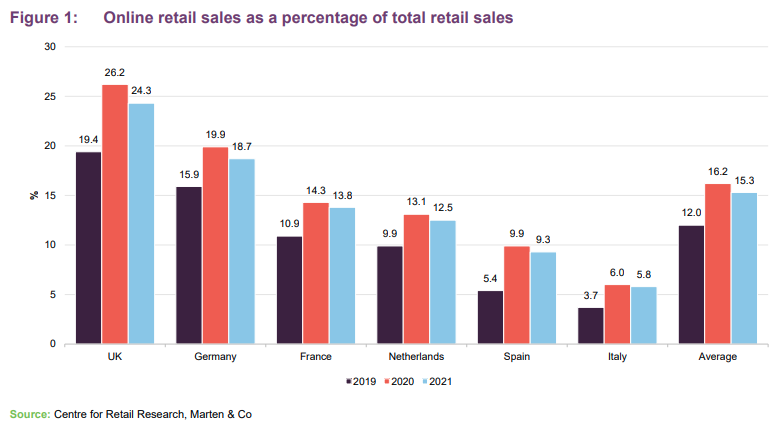
The pandemic, and more recently the Suez Canal incident, brutally exposed weaknesses in the supply chain of many companies and sectors. An over-reliance on manufacturing in Far East Asia was revealed as the flow of goods all but ceased as production shut down. A re-shoring of manufacturing back to Europe is likely to take place in order to avoid a repeat of this scenario, with companies reducing the length of supply chains and bringing manufacturing operations closer to their customers.
The manager says that retailers and manufacturers are also building their inventory levels, which should lead to extra demand for space. Companies that had been increasingly moving to a “just in time” logistics model – where stock levels were at the optimum level, thereby reducing space and cost – are shifting their supply chain models towards a “just in case” approach – ensuring they have sufficient stock to deal with supply chain shocks. Prologis believes the shift from a “just in time” to a “just in case” supply chain model could drive inventory levels up by more than 5% to 10%.
This increased demand has been reflected in take-up figures. Take-up of European logistics space in 2020 hit 32m sqm, according to real estate consultancy firm Cushman & Wakefield, which is a 14% uplift on 2019. In the first quarter of 2021, take-up hit a new first quarter record and was over 30% higher than the five-year first quarter average, according to JLL. Forecasts for take-up for the whole of 2021 are for another increase of 14%, according to independent real estate consultancy firm Buck Consultants International, with established logistics markets Germany, France, the Netherlands and Poland expected to see substantial growth.
Historically low supply causing rental friction
Supply of modern, high-spec logistics facilities in prime locations across Europe has hit record lows. Vacancy rates in most European logistics locations are around 4%, with certain cities at less than 2%, according to Cushman & Wakefield. The low vacancy rates have been driven by a combination of robust occupier demand and a development market dominated by build-to-suit activity (whereby developers build new property with a tenant already signed up to the scheme). Supply constraints are exacerbated by the scarcity of land around most major European cities and logistics developers competing with other property developers – such as residential developers – for sites. Speculative development has risen, as developer confidence returns, but has yet to impact on vacancy rates.
The manager says that rental growth is usually observed at a vacancy rate of around 5% and expects sustained rental growth across the major European logistics markets over the next few years. JLL’s weighted European prime logistics rental index rose 2.6% year-on-year in the first quarter of 2021, as shown in Figure 2.
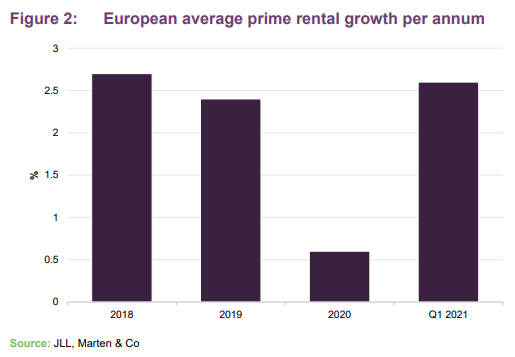
This followed subdued rental growth in 2020 amid the global pandemic. Prime logistics rental growth in the first quarter of 2021 was led by Düsseldorf (9.1%), Dublin (7.7%), Leeds (8.7%), London (6.5%), Madrid (4.5%), Antwerp (4.2%), Budapest (4.2%) and Lyon (4.0%). JLL expects upward pressure on rents to persist throughout 2021 across Europe as strong demand collides with limited supply.
Investment activity remains rampant
Investment activity in the first half of 2020 was understandably subdued following the outbreak of COVID-19, but took off in the second half of the year, with a total of €38.1bn transacted (down 2% on 2019 levels), according to BNP Paribas Real Estate. Investor demand for the sector has continued into 2021, with just under €10bn transacted in the first quarter, the strongest first quarter on record and more than 40% ahead of the first quarter five-year average, according to JLL.
At the end of 2020, BNP Paribas Real Estate had observed average prime yield compression over the year of 25 bps across Europe. The Netherlands (-50 bps to 3.8%), Poland (-50 bps to 5.25%) and Germany (-35 bps to 3.35%) were among the countries to see the biggest yield compression, as shown in Figure 3.
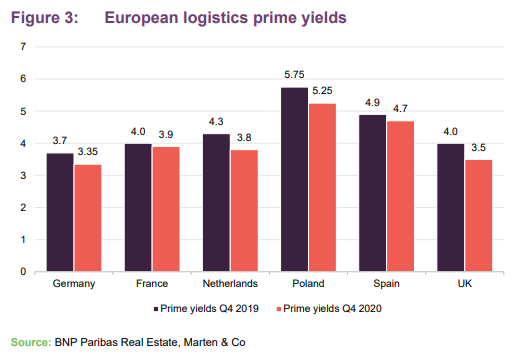
The BNP Paribas Real Estate research added that there were no signs of decompression in the immediate future and instead, prime yields are likely to compress further due to strong demand and the scarcity of products in prime locations.
ASLI’s manager expects yields to compress a further 30 to 50 bps in the next five years on average. He says that the flood of capital focused on the European logistics sector has seen some investors divert from real estate investment fundamentals and not price in risk.
Investment process
ASLI focuses on mid-sized assets in the 10,000 sqm to 40,000 sqm range that is the most liquid part of the market in both investment and letting terms. The properties will predominantly be located at established distribution hubs and within population centres. Typically, these will come with long-term, index-linked leases. The manager may also target properties that could benefit from structural change. When selecting investments, the manager will look at aspects such as:
- the property characteristics and whether they are appropriate for the location (such as technical quality, ESG credentials, scale, configuration, layout, transportation links, power supply, data connectivity, manoeuvrability, layout flexibility, and overall operational efficiencies);
- the location and its role within European logistics (city, regional, national or international distribution), key fundamentals supporting logistics activity within the micro location such as proximity to airport, port, transport nodes, multimodal transport infrastructure, established warehousing hubs, transport corridors, population centres, labour availability and market dynamics such as supply (of both land and existing stock), vacancy rate and planned infrastructure upgrades;
- the terms of the lease(s) (focusing on duration, inflation-linked terms, ESG criteria, level of passing rent relative to market rent, the basis for rent reviews, and the potential for capturing growth in market rental income);
- the strength of the tenant’s financial covenant;
- the business model of the tenant and their commitment to the asset both in terms of capital expenditure and the role it plays in their operations; and
- the potential to implement active asset management initiatives to add value over the holding period.
The team looks at potential acquisitions on a bottom-up basis, ensuring that the locations are suited to the lessor’s target markets. Local market dynamics are more important than macroeconomic considerations.
In addition to buying operational assets, the company may forward fund new developments or commit to buying an asset once building is complete. The manager will do this when it thinks this would lead to better returns for shareholders. It may also be a good way of securing an asset at an attractive yield. These assets will be predominantly pre-let when ASLI commits to the investment or come with a rental guarantee.
Forward funding new developments
ASLI does not undertake speculative development, but has forward funded a selection of developments on the basis that these were 50% pre-let. There are good reasons for this: these deals tend to be agreed off-market and so are not as exposed to competitive pressures; new developments do not attract stamp duty; you can be sure that the tenant is committed to the location; and the buildings are high-quality and, because they are new, have low maintenance costs.
Deals are usually structured so that ASLI makes an upfront payment for the purchase of the land (typically 20%) and then makes monthly instalments dependent on progress. The developer pays a coupon to ASLI during the development. ASI has a strong reputation within the European property market and is therefore a favoured partner for developers and lenders.
Risk limits and controls
The following limits apply at the time ASLI makes an investment:
- ASLI will only invest in assets located in Europe;
- Maximum of 50% of gross assets in any one country;
- Maximum of 20% of gross assets in any one investment;
- Forward-funded commitments will be wholly or predominantly pre-let;
- Maximum 20% of gross assets in forward funded commitments;
- Maximum 20% of gross assets exposed to any single developer;
- No investment in other closed-ended investment companies;
- Tenants must have strong financial covenants (in the manager’s view); and
- No single tenant to provide more than 20% of ASLI’s annual gross income.
Aberdeen Standard’s resources
When it comes to sourcing deals, ASI has offices across Europe, seven of which host real estate professionals. Evert Castelein, who is based in Amsterdam, says that it is important that he has access to local knowledge and a local network, which makes it easier to source off-market deals. Ideas are shared across ASI’s property teams through weekly deal allocation calls. All prospective investments are listed and reviewed on an internal portal, and first right to deals cycles between the teams to ensure that all clients have fair access to prospective investments.
For the most part, the manager finds itself competing against local investors. However, there are quite a few pan-European investors looking at the largest investment grade properties. The manager will check the strength of covenants with external sources such as Dun & Bradstreet, but it also cross-correlates this with information drawn from ASI’s equity and credit teams.
Earlier this year ASI acquired a 60% stake in Tritax Management, the logistics-specialist real estate manager of Tritax Big Box REIT and Tritax EuroBox. As part of the deal, Tritax partners will lead ASI Real Estate’s Global Logistics team and the manager says that this should bring significant additional deal sourcing capabilities to ASI.
Asset allocation
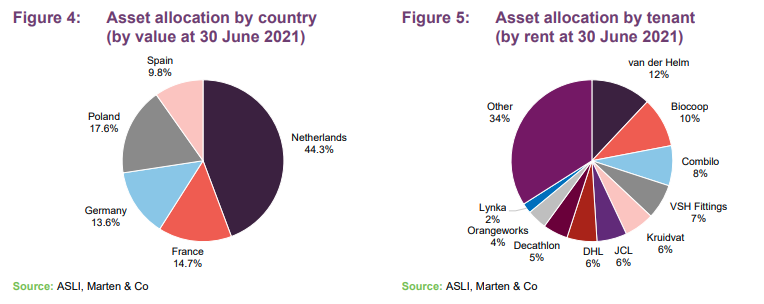
In April this year, the company bought a new warehouse in Lodz, Poland, for which it paid €28m, reflecting a net initial yield of around 5.6% and in July acquired its 16th asset – an urban logistics facility in Barcelona for €18.8m, reflecting a net initial yield of 3.7%. ASLI’s current portfolio is located across five European countries and was valued at €473.9m on 30 June 2021 (not including the Barcelona asset).
ASLI’s portfolio is made up of 43 tenants, diversifying its income. More information on the underlying tenants is given below. The portfolio has a WAULT of just over eight years.
The group collected 97% of rent due in 2020. 99% was collected for the first half of 2021, with 100% for the second quarter of 2021. A small number of tenants requested rent deferrals or rent-free periods at the start of the pandemic in 2020. The majority of the deferred rent was paid in the second half of 2020 or early 2021 and all rents due under the terms of the deferral agreements have so far been paid on time. The small number of agreed rent-free periods were negotiated in exchange for material lease extensions.
The majority of the outstanding rent relates to Office Depot France, the sole tenant at ASLI’s Meung-sur-Loire asset in France, which fell into administration in February 2021 (more detail on page 14). The fourth-quarter 2020 rent was paid in full and since the notice and appointment of an administrator, the rent due for February and March 2021 has been paid, together with rent due for Q2 and Q3 2021. In total, one month’s rent (for January 2021) plus a small element of deferred rent, amounting in aggregate to €258,000, remains outstanding. ASLI has a three-month rental security deposit held at bank that it can recoup.
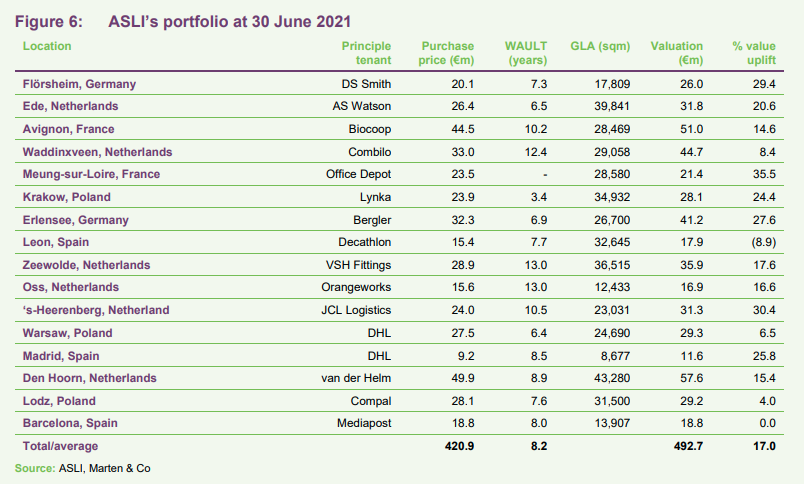
Barcelona
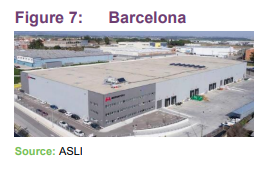
ASLI’s most recent acquisition, for €18.8m, was for a 13,907 sqm urban logistics warehouse in Barcelona. The purchase price reflected a net initial yield of 3.7% and a reversionary yield of 4.7%, due to the rental growth prospects of the asset.
Built in 2019, the building is fully let to Mediapost, a subsidiary of LA POSTE Group, the French state-owned company, serving as its Spanish headquarters. The lease expires in 2029, with a mutual break option in 2026, while rental income will be indexed from 2023.
The warehouse is located in the first ring of Barcelona, within a 25-minute drive (27km) of the city centre. The local market is characterised by a low vacancy rate of 3%, which falls to 1% for the first ring. The property offers a high-grade specification of 11.5 metres clear height in the warehouse area, 10 loading docks, LED lighting and a small number of solar panels, which the company will seek to enhance.
Why does the manager like it? It is well positioned to benefit from the growth of e-commerce and the scarcity of development opportunities in and around Barcelona, which provides strong rental growth potential.
Lodz
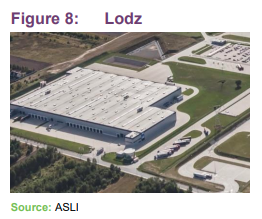
Acquired in April 2021 for €28.0m from logistics developer Panattoni, the 31,500 sqm Panattoni Lodz City VIII Logistics Centre is 100% leased to tenants generating a net annual income €1.59m and has a WAULT of 7.6 years.
The tenants are:
- Bilplast (a manufacturer of thermoplastic elements);
- Tabiplast (a manufacturer of plastic components for household goods and car parts);
- Mecalit Polska (a manufacturer of plastic components);
- Alfa Laval (a Swedish company that produces specialised products and solutions for heavy industry);
- EGT Express Polska (a logistics operator);
- KAN (a Polish retailer that owns the fashion brand Tatuum); and
- Compal (one of the world’s largest computer component manufacturers, which signed a new seven-year lease in February 2021 and supplies the DELL factory located less than 1 kilometre from the site).
The property is located adjacent to a Bosch-Siemens production and distribution campus and benefits from access to the Intermodal Container Terminal, created to support the international white-goods manufacturer, offering direct rail connections with China.
Why does the manager like it? It is located at the heart of one of the Central and Eastern Europe (CEE) region’s most strategically important manufacturing and logistics hubs. The asset’s proximity to the nearby Bosch-Siemens Campus provides strong long-term attraction to occupiers in this supply chain, while the new international railway station and its direct links to China and other European markets provide unrivalled international connections. The Lodz region is in high demand from occupiers and the vacancy rate is one of the lowest in Poland.
Den Hoorn
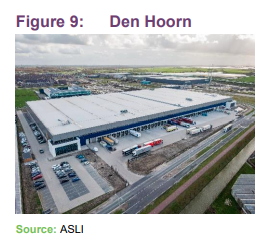
Acquired in January 2020 for €49.9m, the 43,316 sqm logistics facility is the fund’s largest purchase to date. The newly built warehouse was bought on a perpetual leasehold basis with the option to purchase the freehold from the local municipality. It is fully let to logistics operator A.G. Van der Helm Vastgoed Moerdijk B.V. on a 10-year CPI indexed lease.
The warehouse is located within the Randstad region, the most densely populated area in Europe, close to both the Hague and Rotterdam and with access to the A4 connecting Den Hoorn with the port of Rotterdam and Schiphol airport.
In the first quarter of 2021, ASLI signed a 20-year lease with the tenant for the installation of solar panels, which will generate an additional annual income of €80,000 per year and increase the value of the property by almost €800,000. Panels will be installed in the third quarter of 2021.
Why does the manager like it? Its urban location is highly sought after by tenants, giving the asset upside potential on rent. It is a new building with low maintenance costs and strong ESG credentials, such as LED lighting and solar panels.
Madrid
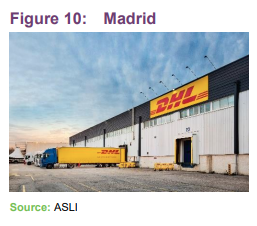
This 6,785 sqm logistics facility, which was acquired in December 2019 for €9.2m, is the first ‘last-mile’ asset in ASLI’s portfolio. It is located in Coslada – a 16-minute drive to Madrid city centre and 1km away from Madrid Barajas International Airport, making it the ideal location for last-mile deliveries.
It is a cross-docked facility, making it ideal for city distribution with lorries bringing in goods at the front end of the building and smaller delivery vans on the opposite side being loaded for onward transmission. It is let to DHL, one of the largest logistics operators in the world, on a 10-year lease linked to CPI.
Why does the manager like it? Its location in the highly supply-constrained Coslada submarket, which connects Madrid with the airport and city centre makes this is an ideal location for city distribution providing upside potential on the rent.
Warsaw
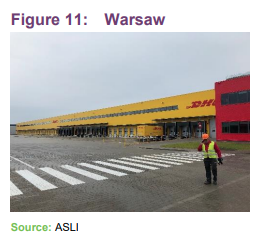
ASLI acquired the new logistics scheme, which was built in 2019, for €27.5m. It comprises two warehouses totalling 24,626 sqm with one of the buildings containing cross-docking facilities.
The scheme’s main tenant is one of the world’s largest logistics companies, DHL. Other tenants include ICS Polska, which specialises in industrial cleaning products, and Spedimex, a logistics company.
Why does the manager like it? The warehouse is located in an established logistics location in Poland, on the A2 motorway, and benefits from close proximity to the city of Warsaw. It is also close to two international airports, which the manager says makes it the ideal location for urban logistics and ecommerce related delivery.
‘s-Heerenberg
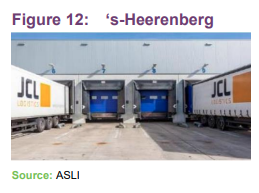
The property, which was acquired in July 2019 for €24.0m, is fully let on a CPI index-linked lease to logistics operator JCL Logistics Benelux. Like the Madrid property, it is cross-docked and located in a strong logistics area – on the border between the Netherlands and Germany. The 23,031 sqm building has a low site coverage, providing expansion/development opportunity.
Why does the manager like it? The manager says that the tenant has a strong covenant, generating a durable income stream. The expansion potential, of around 4,500 sqm, is another positive and there is also the option to add solar panels to the roof.
Oss
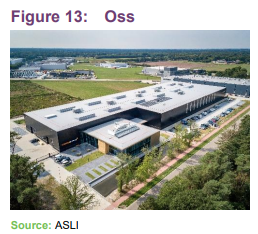
ASLI bought the 12,534 sqm asset, which was completed in July 2019, while the building was in construction, paying €15.7m. The asset is located between the port of Rotterdam and the industrial region of the Ruhr – a logistics hotspot with vacancy rates around 2%.
The tenant, Orangeworks (a Dutch food-processing and handling machinery business), signed a new 15-year triple net lease with no break and rents 100% linked to CPI when the building was completed in July 2019. The building spec includes a five tonne/sqm floor loading capacity and five loading doors. There is an option to extend the building by an additional 3,000 sqm.
Why does the manager like it? The manager likes the location’s strong fundamentals, the triple net lease (in a market where landlords are typically responsible for repairs and maintenance), the length of the lease and the 100% inflation-linkage.
Zeewolde
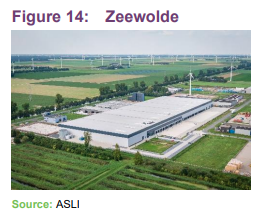
ASLI paid €30.0m for this asset during its construction and was paid a coupon until it was completed in July 2019. It comprises 36,250 sqm of space located in the heart of the Netherlands, near the fast-growing town of Almere. Inditex/Zara has recently built a 100,000 sqm facility here, underlining the area’s desirability as a logistics hotspot. In addition, nearby Lelystad airport is being expanded.
The building is let to VSH Fittings (a Dutch pipes and fittings business, and a subsidiary of Aalberts Industries) on a triple net lease with 13 years to expiry, 100% linked to CPI (but capped at 2.4%).
Why does the manager like it? The manager says that the €41/sqm rent is low, given the building’s central location and ample labour supply. The triple net lease is welcome in a market where landlords are usually responsible for repairs and maintenance. The inflation-linkage is also good news. The manager is looking into the potential installation of solar panels.
Leon
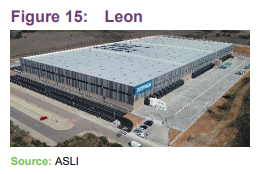
Located in the north-west of Spain, ASLI paid €15.3m for this asset, which was completed in Q1 2019 and fully let to sportswear retailer Decathlon. It comprises three buildings with a total floor area of 32,637 sqm (which could suit a multi-let format in the future, if necessary).
Decathlon, which services 40 shops from the facility as part of its ecommerce business, has an unexpired lease term of 7.7 years, with no breaks, with rent 100% linked to CPI. It also has an option to extend the building by 10,000 sqm.
Why does the manager like it? The manager says the low rent (€32/sqm) is very competitive and index-linked. The extension option creates an opportunity to add value.
Erlensee
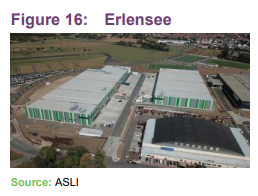
ASLI bought the asset, which comprises two multi-let buildings of 10,919 sqm and 15,431 sqm, for €32.3m. Built in 2018 to modern specifications, including a five tonne/sqm floor loading capacity and 50 loading doors, the asset is 26km north-east of Frankfurt.
The buildings have a WAULT of 6.9 years, with between 80% and 100% of rents linked to CPI. The tenants are:
- Bergler (a third-party logistics operator);
- DS Smith (a packaging company and FTSE100 Index constituent);
- Fenthol & Sandtman (a third-party logistics operator);
- Linde (a chemicals company); and
- MSG Frucht (a German fruit and vegetable supplier, and a subsidiary of Compass Group).
Why does the manager like it? The manager says that the property is in a prime logistics location in an area with a strong economy. The tenant base is diversified (the largest accounts for no more than 30% of the rent). Rents are rising in the area and the rents for this asset are largely linked to inflation.
Krakow
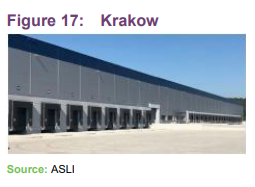
Built in 2018, ASLI paid €24.5m for this asset, equivalent to a net initial yield of 6.8% (the highest in the portfolio). The 34,932 sqm building is located in an established logistics area alongside the A4 motorway, giving access to Germany, Wroclaw and Silesia and also benefits from proximity to Krakow and Katowice international airports.
It is a true multi-let asset, with nine tenants, including DS Smith (a tenant at Erlensee) and Lynka (a provider of textile printing services). The asset has a WAULT of 3.4 years and all leases are 100% linked to CPI.
Why does the manager like it? The flexible structure allows for future reconfiguration if required. In addition, Evert says: “Growing demand for logistics space in one of the most affluent urbanised areas of Poland, together with the diversified income stream make this a very attractive asset.”
Meung-sur-Loire
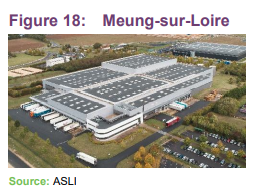
The 30,180 sqm building is let to Office Depot France and was acquired by ASLI for €23.5m. It is located 27km south-west of Orleans and is suited to serving Paris as well as central and southern France. A number of major logistics firms operate from this area, including DHL.
Office Depot France appointed administrators in February 2021 while new owners were sought for the business. Stationery and office supplies retailer Alkor acquired the majority of the Office Depot France business, and foresees retaining 50 of the 60 retail stores. Alkor, which employs 1,850 people and has a consolidated turnover of €440m, will integrate the Office Depot stores into its existing network. While definitive confirmation from the administrator as to the final outcome from the completed sales process has yet to be received, the manager believes that the purchaser of the business will seek to terminate its tenancy of the warehouse.
The manager has appointed agents to find new tenants and is confident of a positive outcome. The potential loss of income will impact on dividend cover for full year 2021, with the property representing 5.6% of the group’s annual rent, until a new tenant is found.
What does the manager say? The manager says that it has several options open to it if the tenant decides to leave. The site’s location makes it suitable as a national distribution centre and it can be re-let to one occupier or split up and let to several tenants. The manager had previously drawn up extension plans which may suit a new tenant. Evert adds that the fund could also sell the asset as vacant, taking advantage of the current hot investment market.
Waddinxveen
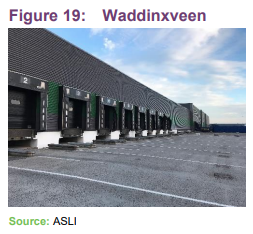
Acquired for €33.0m, this asset, which was constructed in 1983 and part refurbished to modern specifications in 2018, totals 28,131 sqm in size. The tenant, Combilo International, is a fruit and vegetable import/export business and has 12.4 years left on the CPI-linked lease (with no breaks).
The asset, which has 51 loading doors in a cross-dock formation, is located within the Randstad conurbation of the Netherlands (8m consumers live within one hour’s driving distance). The tenant has an option to extend the facility by 5,000 sqm.
Why does the manager like it? The manager says that the low vacancy rate of around 2% in the Randstad area supports future rental growth, but in the meantime, the long index-linked lease with a strong covenant provides an attractive income stream. The tenant is covering maintenance costs and has recently upgraded the office space with an €1.2m investment in the building. Upside potential exists in the form of an extension, if the tenant requires additional space.
Avignon
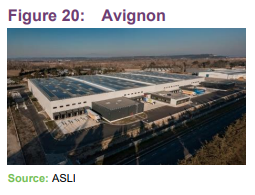
ASLI paid €44.5m for this asset, which comprises 28,571 sqm arranged as four cells, two of which (2/3 of floor space) are cold storage. It is located in the Noves suburb of Avignon with good road links to Marseille, Lyon and Montpellier.
The buildings have a WAULT of 10.2 years and rents are 100% linked to ILAT (the French measure of inflation). The property is the headquarters of Biocoop, the leading organic supermarket in France with over 500 stores located across the country. It migrated its south-east distribution centre (one of four centres) to Noves from Sorgues, where it had an 18,000 sqm facility constructed in 1984.
The impact of cold storage usage on energy usage and carbon emission is offset by solar panels on the roof. The panels generate an additional annual income of €160,000.
Why does the manager like it? The manager says that the building is of very high quality, being Biocoop’s HQ. Land supply in the area is constrained and the building comes with a tenant with a strong covenant and index-linked rent. The manager says that the sustainability credentials of the building increases the stickiness of the tenant to the building.
Ede
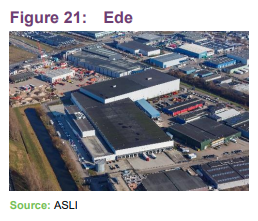
The 39,840 sqm building, which ASLI paid €26.5m for, was originally constructed in 1999 but half of the building was fully refurbished in 2018.
The asset, which is centrally located within the Netherlands in an area of just 3.9% vacancy for logistics assets, has a WAULT of 6.5 years with no break and the rental income is 100% linked to CPI. The tenant is Kruidvat, a leading drugstore in the Netherlands and part of the AS Watson Group, which is using the facility for ecommerce related activities due to its central location in the Netherlands.
Why does the manager like it? The manager likes the location, close to the main transport corridors towards Germany, the strong tenant covenant and the attractive 5.9% yield (especially given the inflation-linkage and WAULT).
Flörsheim
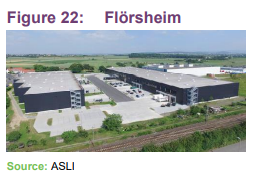
Flörsheim was ASLI’s first acquisition, in February 2018. It paid €20.1m for the asset, which comprises two multi-let buildings of 10,762 sqm and 7,047 sqm and is located 15km from Frankfurt Airport.
The buildings have a WAULT of 7.3 years and rents are 100% linked to CPI. The tenants are: Maintrans (a third-party logistics firm); DuHome (an ecommerce retailer); Ernst Schmitz (a third-party logistics firm); Horiba (a global coatings and materials business); and Hangcha Europe (a forklift and material handling business).
Why does the manager like it? The manager says that there is limited logistics capacity in the Rhine-Main region, with less than a 5% vacancy rate. The local economy is strong and the building is of good quality in its view. The manager says that the diversified tenant base and the CPI-linked rents are a further source of comfort, with market evidence showing growing rents in the area.
Strong ESG credentials
ASLI has been awarded four green stars out of a maximum of five by the Global Real Estate Sustainability Benchmark (GRESB) survey after making significant progress with ESG across its portfolio. This compares to the previous two stars awarded in 2019. The portfolio’s GRESB score of 79/100 compares favourably to the 68/100 average score for the Western Europe Industrial Distribution Warehouse peer group, which contains 19 funds.
ESG initiatives include a significant roll out of solar panel installations, a tenant satisfaction survey, LED lighting in all buildings and 100% data collection across the portfolio linked to Envizi, which is used to analyse energy consumption. The manager says it will pilot the use of smart meters to collect tenant utility usage data, initially at its Avignon and Waddinxveen properties, with a view to identifying new initiatives to further enhance the sustainability rating of the assets.
The manager plans to further enhance sustainability credentials across the portfolio. It has signed 20-year lease agreements with solar panel specialists for the installation of PV on the roof space at its Ede and Den Hoorn assets in the Netherlands. At Ede, this has generated €15,000 of additional annual income and has increased the value of the property by €119,000. At Den Hoorn, an additional €80,000 of annual income should be generated from September 2021 and the value of the property could increase by around €800,000. Nine of the 16 assets in the portfolio now have solar panels on the roof and the manager is actively exploring the possibility of adding to or enhancing rooftop solar panels to selected assets.
Proposed equity raise and issuance programme
ASLI had been slowly growing its portfolio through the use of its €40m revolving credit facility (RCF) – conducting small equity raises to pay the loan down, before repeating the process on further identified assets. The manager says that this method of growth avoided the impact of cash drag that a larger raise would bring, given the time it can take to complete investment deals. The company has agreed to increase its RCF to €70m to provide additional flexibility.
It has now proposed a £75m equity raise having identified a pipeline of potential acquisitions worth more than €165m. The manager expects the proceeds from the issue to be deployed within three to six months. The issue price of 109p per share is an 8.4% discount to its closing price of 119p on 7 September and a 2.7% premium to its June 2021 NAV of 106.1p.
The company also intends to put in place a share issuance programme to issue up to a further 250 million ordinary shares and/or C shares, allowing the manager to raise money to acquire identified assets quickly.
A general meeting is expected to take place on 30 September for shareholders to approve the issue and share issuance programme and dealing in the shares is expected to commence on 1 October 2021.
The pipeline
The manager says that it is currently performing due diligence on a pipeline of mid-box and urban logistics warehouses worth in excess of €165m, with a strong weighting towards urban logistics warehouses. While these assets are all located in countries ASLI is currently invested in, the manager says that it is also actively exploring opportunities in new geographies, including the Nordics. As mentioned earlier, a number of opportunities also exist within the current portfolio for expansion developments on adjoining or adjacent plots, which could be funded by the company on a pre-let basis and at an attractive yield on cost.
The majority of the pipeline assets are being negotiated on an off-market basis and were originated by ASI’s local transaction managers, a competitive advantage for the group.
Performance
ASLI’s NAV initially made modest progress from launch, with rising property values offset by expenses incurred in establishing the portfolio. As the portfolio has expanded and valuations increased, the NAV total return has moved up. The NAV is reported in both euro and sterling. The NAV in Figure 23 is in sterling and can be sensitive to the euro-sterling exchange rate. The NAV at 31 March 2021 increased in euro terms but fell in sterling due to the unfavourable exchange rate. The 30 June 2021 NAV increased in both euro and sterling terms due to another uplift in portfolio values.
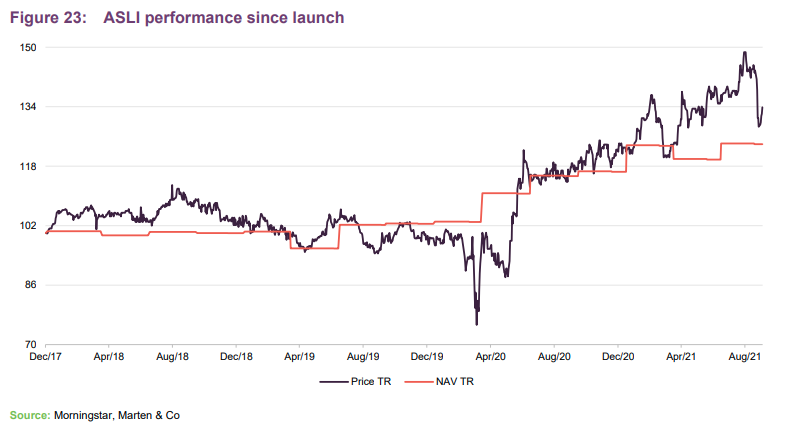
Peer group

Most of those investing in European logistics are unlisted funds or subsidiaries of larger groups. The listed peer group we have assembled consists of: Tritax EuroBox, ASLI’s closest competitor; SEGRO, which owns a mixture of ‘big box’, urban and industrial space (about a third of which is located in continental Europe); Tritax Big Box; and LondonMetric Property. The latter two are UK-focused.
ASLI is at the smaller end of this peer group, as it continues to grow its portfolio. The yield is superior to peers and over the last year it has produced solid NAV and share price total returns.
Dividend
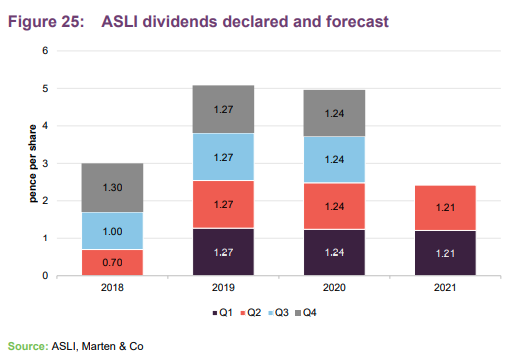
ASLI declared a quarterly dividend of 1.41 euro cents (1.21p) per share for the second quarter of 2021 and is targeting an annual dividend of 5.64 euro cents (4.84p) per share. The company paid 3p per share in the period from launch to 31 December 2018, 5.64 euro cents (5.08p) per share in distributions in respect of the year to 31 December 2019 (achieving its target of 5% of the IPO price) and 5.64 euro cents (4.96p) per share in respect of 2020.
References to ‘dividends’ in this note cover both dividend income, and income which is designated as an interest distribution for UK tax purposes, and therefore subject to the interest-streaming regime applicable to investment trusts.
Premium/(discount)
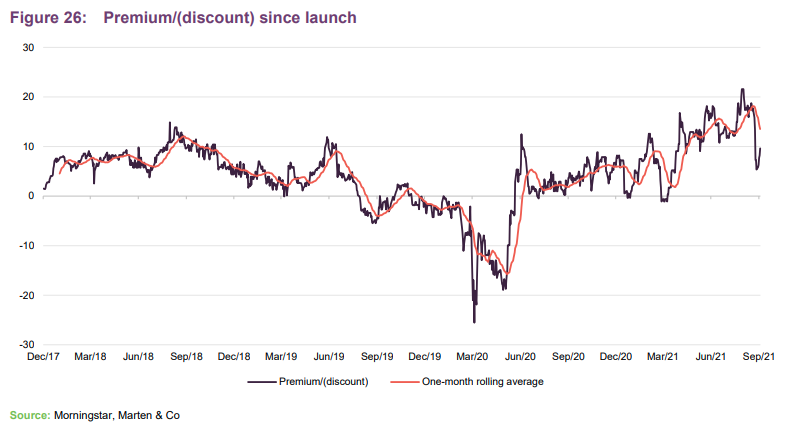
ASLI has almost exclusively traded at a premium following its launch. Its share price slumped in March 2020 as part of a wider market sell-off as the COVID-19 pandemic hit, with its discount widening to 26%. It quickly regained its losses and perhaps as the market recognised the strength of its portfolio and the developing logistics market, its rating moved to a premium. On 17 September 2021 it was trading at a 9.6% premium to NAV.
In the event that the ordinary shares trade at a premium, ASLI has the authority from shareholders to issue new shares that could be used to satisfy any excess market demand.
Similarly, should the shares trade at a discount, ASLI has authority to repurchase up to 14.99% of its issued share capital. ASLI says that the directors will consider repurchasing ordinary shares in the market if they believe it to be in shareholders’ interests and as a means of correcting any imbalance between the supply of and demand for the ordinary shares.
Fees and costs
The AIFM is a subsidiary of ASI, sub-delegating investment management to a subsidiary based in Dublin. Under the terms of the management agreement, as amended in December 2018, the AIFM is entitled to receive a tiered annual management fee as follows:
- 0.75% of net assets up to €1.25bn
- 0.60% of any net assets in excess of €1.25bn.
The annual management fee is calculated and paid quarterly in arrears and there is no performance fee. The management agreement can be terminated on 12 months’ notice, by either side. The AIFM provides services in respect of company secretarial services, day-to-day administration, accounts preparation and NAV publication. The accounting and administrative functions are delegated to Brown Brothers Harriman.
Capital structure and life
ASLI has 262,950,001 ordinary shares in issue and no other classes of share capital. The fund’s year end is 31 December. It published its annual report in May 2021 and held its AGM in June 2021.
Borrowing
ASLI uses gearing with the aim of enhancing shareholder returns. All financing decisions are organised by the manager’s in-house treasury team (located in Frankfurt, London and Edinburgh) and must be approved by the investment committee.
ASLI has total fixed-term debt arrangements of €144.6m and a loan to value (LTV – debt relative to gross assets) of 31.7% at 19 August 2021, which is below its long-term target of 35%. The debt is typically held at the asset level, rather than the company level. Borrowings are secured against individual assets or groups of assets with cross-collateralisation. Debt at asset level may increase temporarily from 35% where the manager seeks to undertake asset management initiatives or purchases, in advance of a cash raise, through the use of a revolving credit facility (RCF).
The loans are fixed with an average all-in cost of 1.4% and a remaining maturity of 5.25 years. The manager aims to avoid taking on debt that amortises. In October 2020, ASLI secured a new €40m RCF with Investec Bank on a four-year term. Under the facility, the company can make requests for drawdowns at selected short-duration tenors, as and when required, to fund acquisitions or for other liquidity requirements. The manager expects to sign a revised RCF agreement with Investec Bank, increasing the current facility’s capacity to €70m, providing further funds for the acquisition of new assets.
Aggregate borrowings will always be subject to an absolute maximum, calculated at the time of drawdown, of 50% of gross assets. Furthermore, where borrowings are secured against a group of assets, any such group of assets shall not exceed 25% of ASLI’s gross assets with the aim that investment risk remains suitably spread.
Continuation vote at sixth AGM
ASLI has an unlimited life, but shareholders will be offered a continuation vote at the company’s sixth AGM following admission. Thereafter, shareholders are to be offered continuation votes at three-yearly intervals. In the event that a continuation resolution fails to pass, the directors will cease further investment, the properties in the portfolio will be sold in an orderly fashion and the net funds available for distribution will be returned to shareholders.
The investment team
ASLI’s investment team is made up of Evert Castelein (fund manager), Attila Molnár (deputy fund manager) and James Wythe (deputy fund manager). The team has over 20 years’ combined experience of investing in European logistics, and Aberdeen Standard Investments is currently managing €17bn of logistics warehouses in Europe.
Evert Castelein – fund manager (Amsterdam)
Evert is the primary fund manager responsible for the company’s portfolio. Prior to ASLI’s launch, he was assistant fund manager for the Aberdeen European Balanced Property Fund. Evert joined the ASI Real Estate Fund team in 2012, prior to which he was responsible for the asset management of a small German and Swedish fund and also senior analyst within the property research and strategy team of Aberdeen Asset Management Plc (AAM). Evert joined Goodman Property Investors (a leading unlisted property partnership investing in logistics real estate across Europe, which was acquired by AAM in 2008) in 2006, and previously worked as a research analyst at FGH Bank Netherlands, a market leader in the financing of Dutch commercial real estate. He graduated with a Masters degree in Economic Geography from the University of Groningen and has a Masters of Science in Real Estate (MSRE). He speaks English, Dutch, German and French.
Attila Molnár – deputy fund manager (Frankfurt)
Attila is fund manager at Aberdeen Immobilien KAG, based in Frankfurt, Germany. Attila joined Dresdner Bank’s property fund management business (DEGI) in 2006, shortly before the business was acquired by Aberdeen. He has been involved from the beginning in the planning and establishment of new product lines for institutional clients and joined the fund management teams of those funds. Now he is responsible for two institutional funds. Prior to this, Attila worked for PricewaterhouseCoopers where he was responsible for diverse audit and due diligence projects in the property fund business. Attila graduated with an MSc in Accounting and Finance from Budapest University of Economics. He speaks German, Hungarian and English.
James Wythe – deputy fund manager (Amsterdam)
James is deputy fund manager of ASLI. He joined what was Standard Life Investments in 2016, just before the merger with AAM, to assist with the management of a balanced Dutch and Swedish portfolio. He took over responsibility for managing that portfolio during 2018 before joining the ASLI team in 2019. James graduated with a BSc in Biology from The University of Nottingham and has an MSc in Real Estate from the University of Reading. He is also a member of the RICS.
Aberdeen Standard Investments Real Estate
Aberdeen Standard Investments Real Estate is the second-largest European real estate investment manager, with total direct real estate assets under management of €45bn. It has an extensive regional presence with offices in eight countries across the UK and continental Europe. The pan-European real estate team is comprised of over 225 real estate professionals with expertise in fund management, research, transactions, asset management, financing and other specialist property activities. The manager says that having teams in the key target markets in which the company proposes to invest provides a significant competitive advantage, with improved local market knowledge, better access to potential deals, closer implementation of asset business plans and improved ability to manage and mitigate risk.
Earlier this year ASI acquired a 60% stake in Tritax Management, the manager of Tritax Big Box REIT and Tritax EuroBox. As part of the deal, Tritax partners will lead ASI Real Estate’s Global Logistics team. Tritax and ASI have said Tritax Big Box, EuroBox and ASLI would retain their investment decision making autonomy and control following the deal. ASLI’s manager says that the tie-up should improve the ability to source deals for the fund.
Board
The ASLI board has four members. Tony Roper was appointed chairman following the company’s AGM in June 2019. All directors are independent of the manager and do not sit together on other boards.

Tony Roper
Tony started his career as a structural engineer with Ove Arup and Partners in 1983. In 1994 he joined John Laing Plc to review and make equity investments in infrastructure projects both in the UK and abroad. In 2006, Tony joined HSBC Specialist Investments (part of the HSBC Holdings group) to be the fund manager for HICL Infrastructure Company Limited, and continued in this role until May 2017, during which time HICL grew from £250m to circa £2.8bn. In 2011, he was part of the senior management team that bought HSBC Specialist Investments from HSBC, renaming it InfraRed Capital Partners. Tony was a Managing Partner and a senior member of the infrastructure management team at InfraRed Capital Partners until June 2018. Tony remains a non-executive director for them on Affinity Water Limited. He holds a MA in Engineering from Cambridge University and is an ACMA.
Caroline Gulliver
Caroline is a chartered accountant with over 25 years’ experience at Ernst & Young LLP, latterly as an executive director before leaving in 2012. During that time, she specialised in the asset management sector and developed an extensive experience of investment trusts. She was a member of The Association of Investment Companies’ Technical Committee and also the AIC SORP working party for the revision to the 2009 investment trust SORP. Caroline is also a non-executive director and audit committee chair for JP Morgan Global Emerging Markets Income Trust Plc, International Biotechnology Trust Plc and Civitas Social Housing Plc.
John Heawood
John has 40 years’ experience as a Chartered Surveyor advising a broad range of investors, developers and occupiers. In 1987 he became a partner, and subsequently a director, of DTZ, responsible for the London-based team dealing with industrial, logistics and business park projects across the UK. John was appointed to the board of SEGRO Plc in 1996 and was responsible for its UK business for the next 12 years. From 2009–2013 he was managing director of the Ashtenne Industrial Fund a £500m multi-let industrial and logistics portfolio managed by Aviva on behalf of 13 institutional investors. John is currently a member of council and the finance and general purposes committee of the Royal Veterinary College and a trustee of Marshalls Charity, a Southwark-based charity established in 1631. He holds a BSc in Estate Management and an MSc in Rural Planning Studies from the University of Reading.
Diane Wilde
Diane has over 30 years’ experience of managing equity, balanced and multi-asset funds in both the asset management and wealth management sectors. She was managing director at Gartmore Scotland Ltd, managing investment trust assets on behalf of the company from 1993 to 2000. Following a period of managing similar assets at Aberdeen Asset Managers between 2000 and 2003, she joined Barclays Wealth as Head of Endowment Funds in Scotland. A former member of the Pension Fund Advisory Committee to the Barclays Bank UK Retirement Fund, Diane was a senior adviser at Allenbridge, an investment consulting firm, until May 2018. She is also a board member of the Social Growth Fund, managed by Social Investment Scotland (SIS), a leading social enterprise and impact investor in Scotland and the United Kingdom. Diane holds a BA in Economics and Social Administration from the University of Strathclyde.
Previous publications
QuotedData has published four previous notes on ASLI. Details can be found below or by clicking here.

The legal bit
Marten & Co (which is authorised and regulated by the Financial Conduct Authority) was paid to produce this note on Aberdeen Standard European Logistics Income Plc.
This note is for information purposes only and is not intended to encourage the reader to deal in the security or securities mentioned within it.
Marten & Co is not authorised to give advice to retail clients. The research does not have regard to the specific investment objectives financial situation and needs of any specific person who may receive it.
The analysts who prepared this note are not constrained from dealing ahead of it but, in practice, and in accordance with our internal code of good conduct, will refrain from doing so for the period from which they first obtained the information necessary to prepare the note until one month after the note’s publication. Nevertheless, they may have an interest in any of the securities mentioned within this note.
This note has been compiled from publicly available information. This note is not directed at any person in any jurisdiction where (by reason of that person’s nationality, residence or otherwise) the publication or availability of this note is prohibited.
Accuracy of Content: Whilst Marten & Co uses reasonable efforts to obtain information from sources which we believe to be reliable and to ensure that the information in this note is up to date and accurate, we make no representation or warranty that the information contained in this note is accurate, reliable or complete. The information contained in this note is provided by Marten & Co for personal use and information purposes generally. You are solely liable for any use you may make of this information. The information is inherently subject to change without notice and may become outdated. You, therefore, should verify any information obtained from this note before you use it.
No Advice: Nothing contained in this note constitutes or should be construed to constitute investment, legal, tax or other advice.
No Representation or Warranty: No representation, warranty or guarantee of any kind, express or implied is given by Marten & Co in respect of any information contained on this note.
Exclusion of Liability: To the fullest extent allowed by law, Marten & Co shall not be liable for any direct or indirect losses, damages, costs or expenses incurred or suffered by you arising out or in connection with the access to, use of or reliance on any information contained on this note. In no circumstance shall Marten & Co and its employees have any liability for consequential or special damages.
Governing Law and Jurisdiction: These terms and conditions and all matters connected with them, are governed by the laws of England and Wales and shall be subject to the exclusive jurisdiction of the English courts. If you access this note from outside the UK, you are responsible for ensuring compliance with any local laws relating to access.
No information contained in this note shall form the basis of, or be relied upon in connection with, any offer or commitment whatsoever in any jurisdiction.
Investment Performance Information: Please remember that past performance is not necessarily a guide to the future and that the value of shares and the income from them can go down as well as up. Exchange rates may also cause the value of underlying overseas investments to go down as well as up. Marten & Co may write on companies that use gearing in a number of forms that can increase volatility and, in some cases, to a complete loss of an investment.
